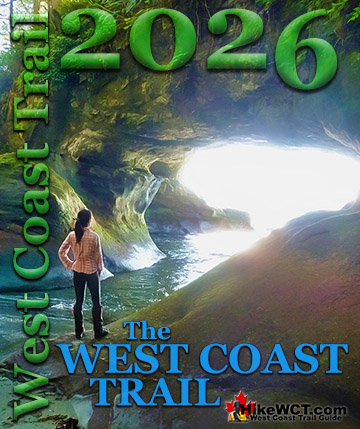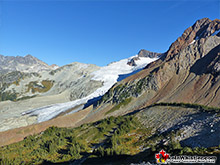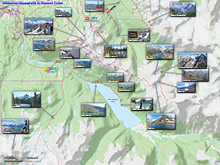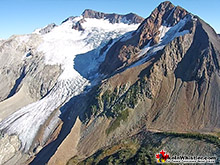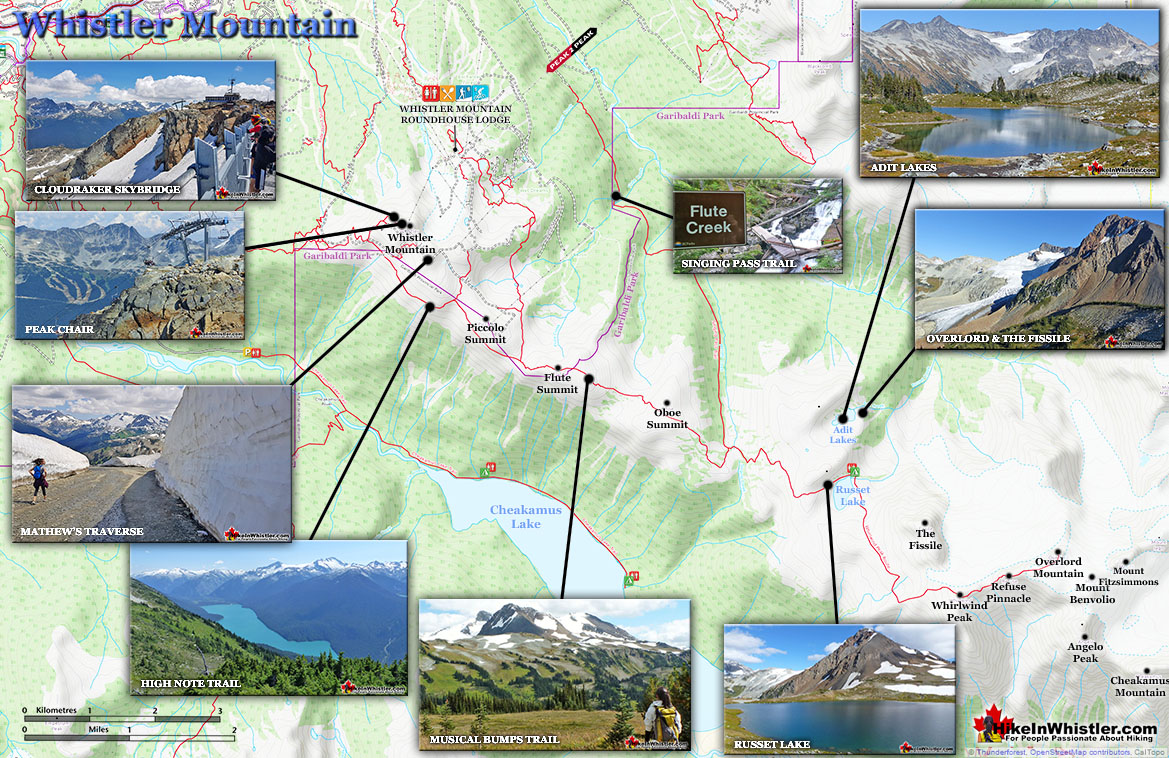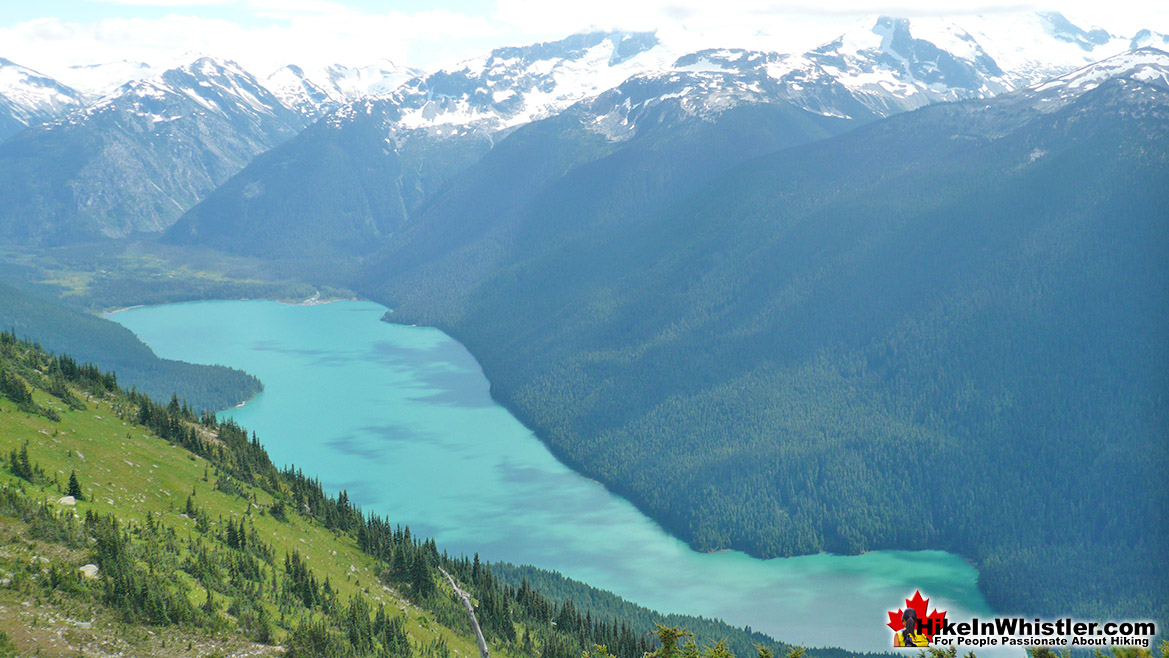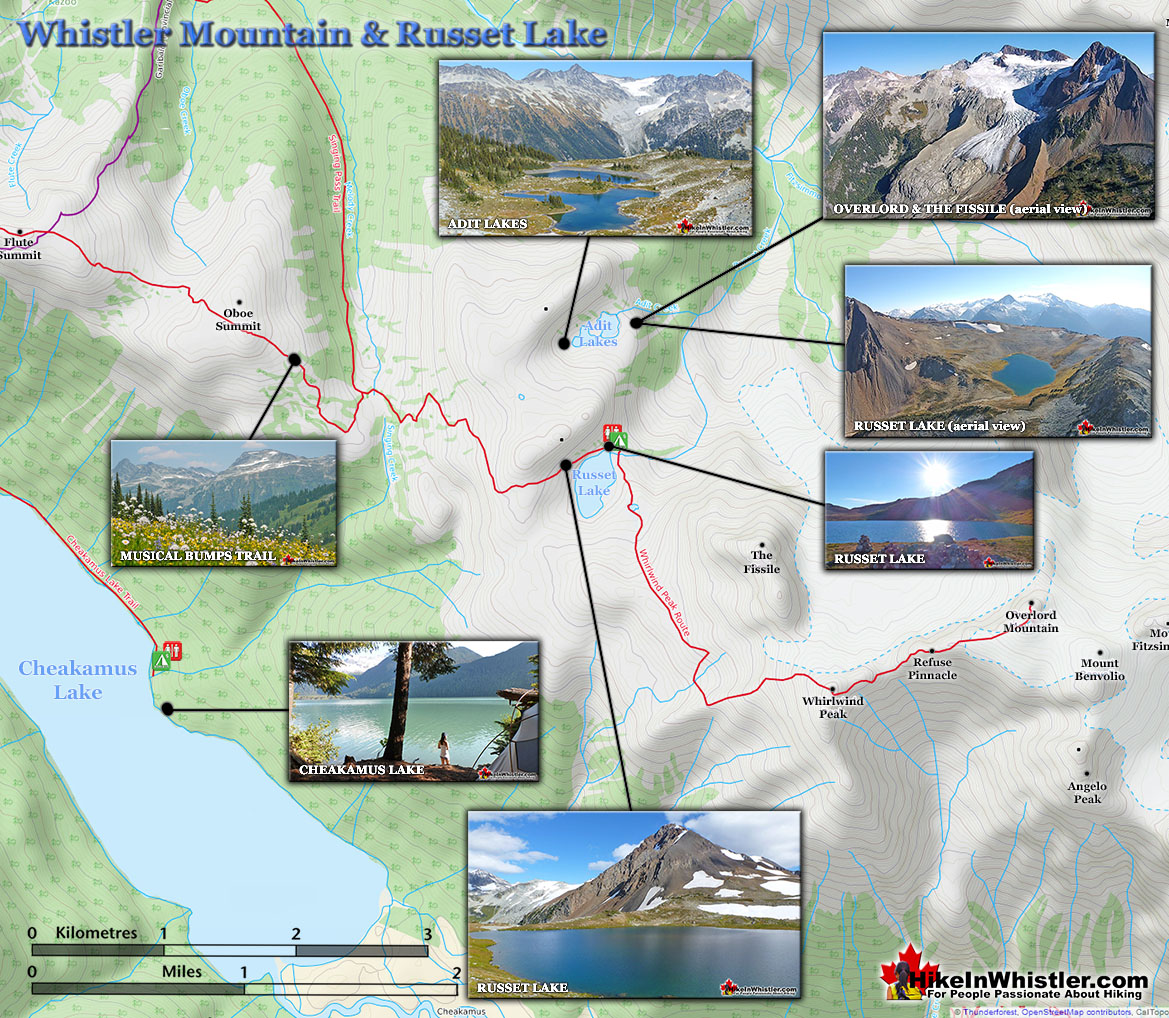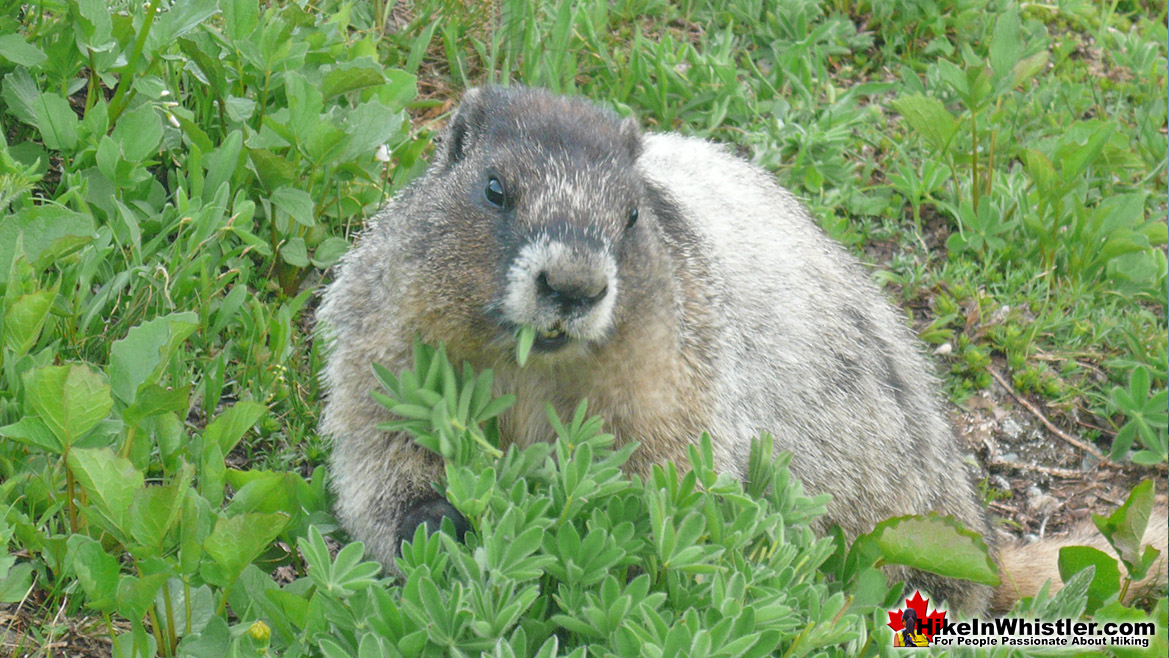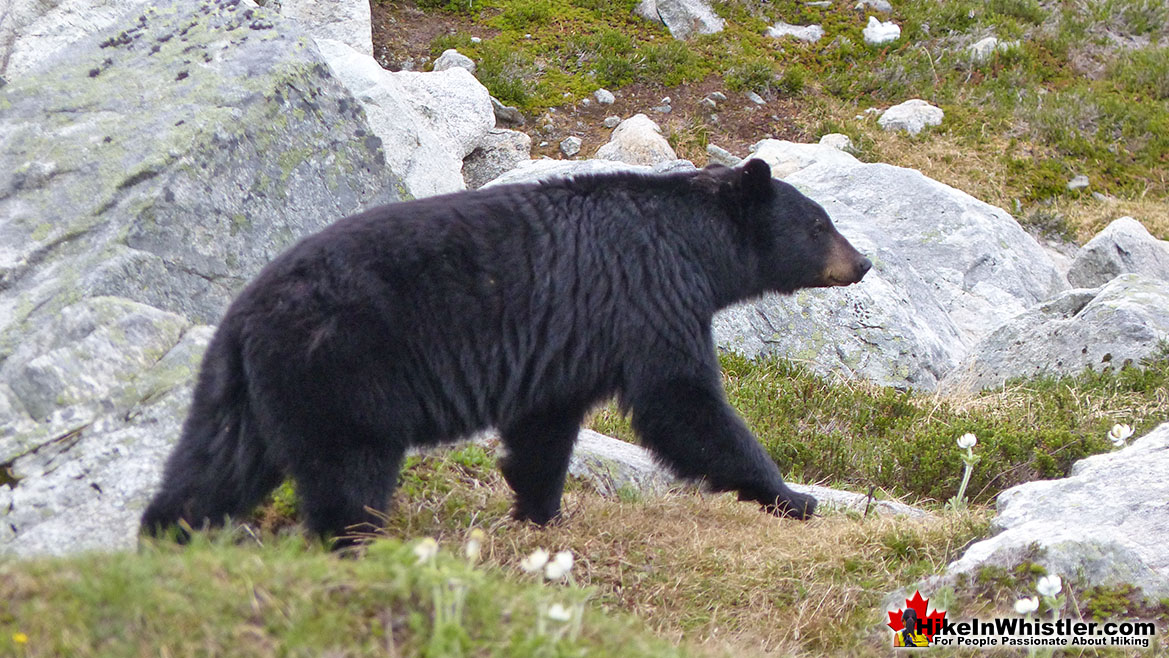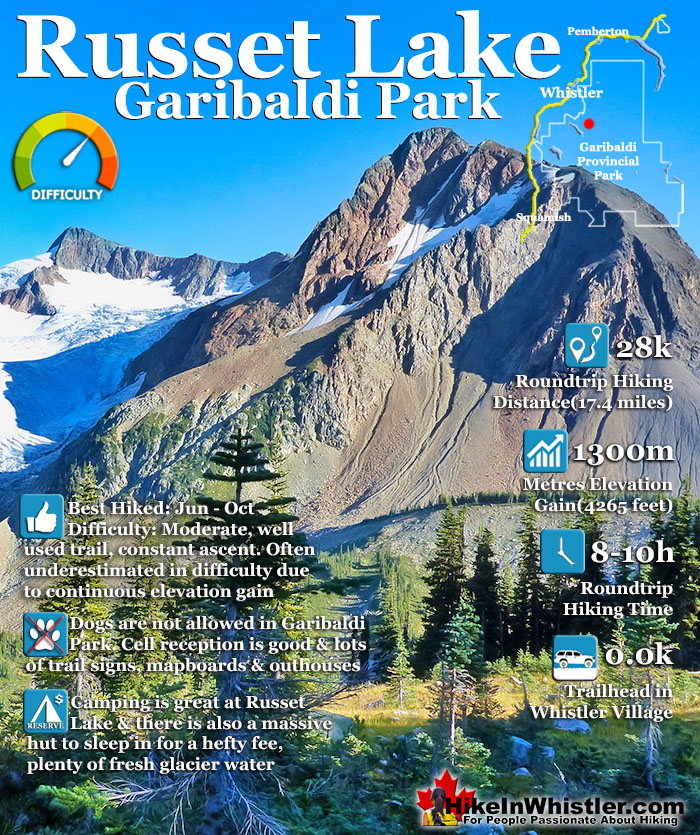
![]() Russet Lake is a surreal little paradise that lays at the base of The Fissile, in Garibaldi Provincial Park. The Fissile is the strikingly bronze mountain visible from Whistler Village. From the Village look into the distance at the Peak2Peak Gondola hanging between Whistler Mountain and Blackcomb Mountain and you will see The Fissile. Its pyramid shape in the distance perfectly separates the two mountains.
Russet Lake is a surreal little paradise that lays at the base of The Fissile, in Garibaldi Provincial Park. The Fissile is the strikingly bronze mountain visible from Whistler Village. From the Village look into the distance at the Peak2Peak Gondola hanging between Whistler Mountain and Blackcomb Mountain and you will see The Fissile. Its pyramid shape in the distance perfectly separates the two mountains.
 At least 5 amazing routes to this hidden paradise
At least 5 amazing routes to this hidden paradise The Fissile looms ominously over the lake
The Fissile looms ominously over the lake Overlord Glacier fills the valley below and across
Overlord Glacier fills the valley below and across Part of the Spearhead Traverse
Part of the Spearhead Traverse Every direction you look is shockingly beautiful
Every direction you look is shockingly beautiful Adit Lakes is a hidden world nearby
Adit Lakes is a hidden world nearby Scrambling routes up & beyond The Fissile!
Scrambling routes up & beyond The Fissile! Musical Bumps Trail to Russet is very beautiful
Musical Bumps Trail to Russet is very beautiful Russet Lake is not as beautiful as other lakes
Russet Lake is not as beautiful as other lakes The old 5k access road is inaccessible due to slide
The old 5k access road is inaccessible due to slide
Whistler & Garibaldi Hiking
![]() Alexander Falls
Alexander Falls ![]() Ancient Cedars
Ancient Cedars ![]() Black Tusk
Black Tusk ![]() Blackcomb Mountain
Blackcomb Mountain ![]() Brandywine Falls
Brandywine Falls ![]() Brandywine Meadows
Brandywine Meadows ![]() Brew Lake
Brew Lake ![]() Callaghan Lake
Callaghan Lake ![]() Cheakamus Lake
Cheakamus Lake ![]() Cheakamus River
Cheakamus River ![]() Cirque Lake
Cirque Lake ![]() Flank Trail
Flank Trail ![]() Garibaldi Lake
Garibaldi Lake ![]() Garibaldi Park
Garibaldi Park ![]() Helm Creek
Helm Creek ![]() Jane Lakes
Jane Lakes ![]() Joffre Lakes
Joffre Lakes ![]() Keyhole Hot Springs
Keyhole Hot Springs ![]() Logger’s Lake
Logger’s Lake ![]() Madeley Lake
Madeley Lake ![]() Meager Hot Springs
Meager Hot Springs ![]() Nairn Falls
Nairn Falls ![]() Newt Lake
Newt Lake ![]() Panorama Ridge
Panorama Ridge ![]() Parkhurst Ghost Town
Parkhurst Ghost Town ![]() Rainbow Falls
Rainbow Falls ![]() Rainbow Lake
Rainbow Lake ![]() Ring Lake
Ring Lake ![]() Russet Lake
Russet Lake ![]() Sea to Sky Trail
Sea to Sky Trail ![]() Skookumchuck Hot Springs
Skookumchuck Hot Springs ![]() Sloquet Hot Springs
Sloquet Hot Springs ![]() Sproatt East
Sproatt East ![]() Sproatt West
Sproatt West ![]() Taylor Meadows
Taylor Meadows ![]() Train Wreck
Train Wreck ![]() Wedgemount Lake
Wedgemount Lake ![]() Whistler Mountain
Whistler Mountain
![]() January
January ![]() February
February ![]() March
March ![]() April
April ![]() May
May ![]() June
June ![]() July
July ![]() August
August ![]() September
September ![]() October
October ![]() November
November ![]() December
December
Though Russet Lake is not terribly impressive in terms of size or colour, the valley around it is remarkably beautiful. The colours change from moment to moment in and extraordinary way. The distinctive colour of The Fissile and the stark grey of the mountains around contrast amazingly with the blue of the lake and green grass in the valley. So many different factors fill the place with colour. There are several ways to get to hike Russet Lake. The Singing Pass trail from the base of Whistler Mountain near the Whistler Gondola. The Musical Bumps trail that begins near the top of the Whistler Gondola. Both routes take you deep into the magnificent Fitzsimmons Range. The Fitzsimmons Range runs east from the summit of Whistler Mountain to Russett Lake. Fitzsimmons Creek cuts between Whistler Mountain and Blackcomb Mountain, parallel to the Singing Pass trail. Where the Fitzsimmons Range ends at Fitzsimmons Creek, the Spearhead Range begins and continues along a set of peaks resembling spearheads to Blackcomb Mountain. These peaks include The Spearhead, Mount Trorey, Tremor, Shatter, Shudder, Quiver, and more.
Trails to Russet Lake
The High Note trail that begins at the top of the Peak Chair on Whistler Mountain. There is an increasingly popular route that begins from Blackcomb Mountain. And finally, a very infrequently hiked route from Cheakamus Lake that runs along Singing Creek. In short, the three ways to get to Russet Lake are 1. Musical Bumps (direct route and beautiful), 2. High Note trail(a bit longer but even more beautiful), and the Singing Pass trail (not as nice as the previous two and constantly uphill, but no expensive gondola charge).
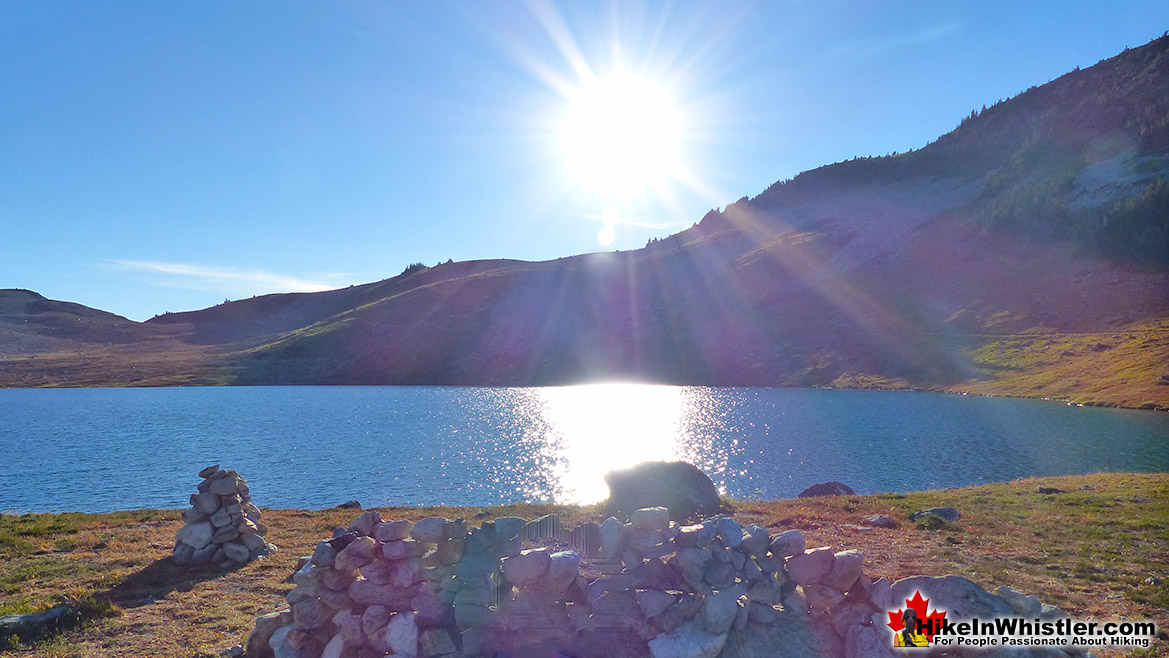
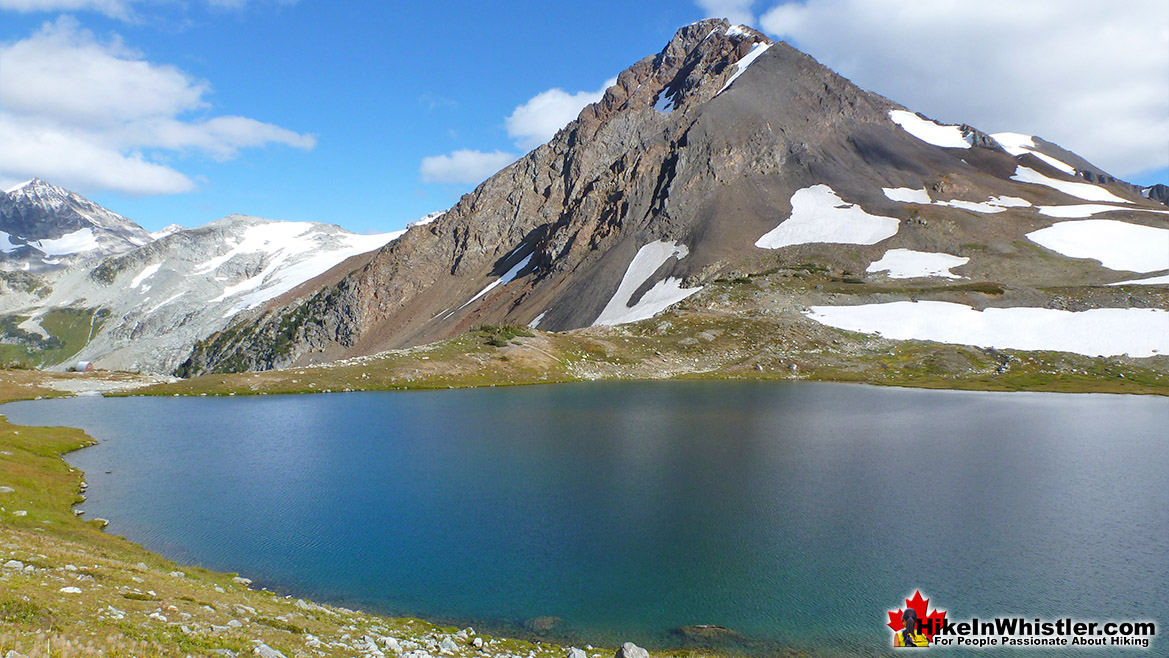
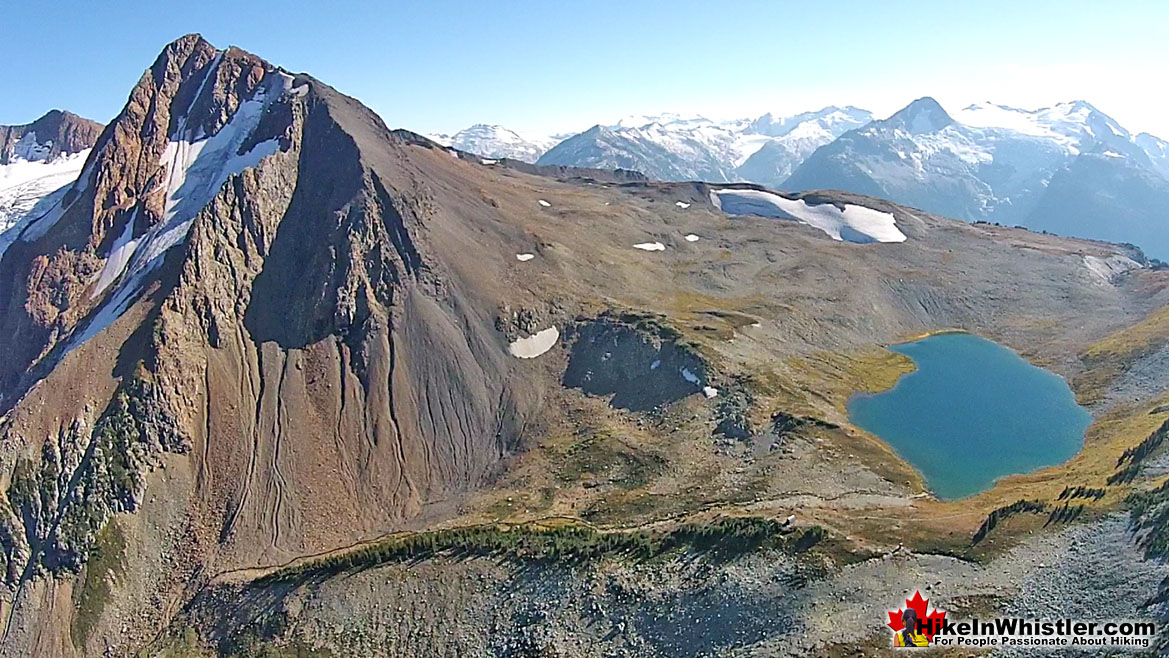
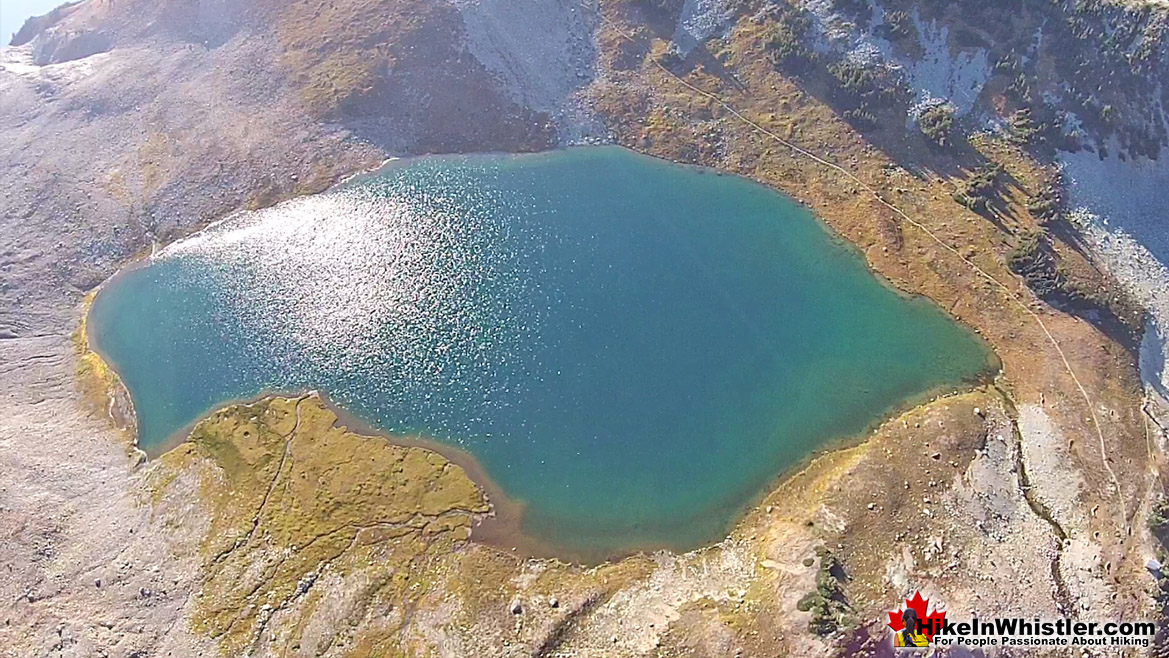
Comparing the Trails to Russet Lake
All three routes are have signs and well established trails. None are very difficult with the exception of being long trails. Though each can be done in a day, 28 kilometres of hiking in one day is quite a long way. Russet Lake is a beautiful place to camp and has an elaborate 38 bed hut available to use by anyone for $50 per person. It is pretty huge and is kept at a minimum temperature of 5c along with propane burners, cooking supplies, pots, plates etc. It has a propane generator that charges batteries for LED lighting and USB charging ports for your gadgets. There are also vent heaters and plenty of ventilation as well as basic toilet facilities. Sadly the original Russet Lake Hut, aka the Himmelsbach Hut was removed recently. This much loved little hut was built in just three days in 1968 by the BC Mountaineering Club. The following year they built the Wedge Hut at Wedgemount Lake in almost the same design. The much cherished Wedge Hut is still in its original location overlooking Wedgemount Lake and hopefully will remain for some time. The Russet Lake hut is rumoured to be getting relocated to Mount Sproatt to be used by rangers.
Tent camping is very nice at Russet Lake and your tent view will almost certainly be extraordinary. From a idyllic stream flowing past, or the towering Fissile, or Russet Lake, or Overlord Mountain, or the valley below with Overlord Glacier, you have plenty of choices to greet you in the morning from your tent. There no fancy tent platforms like you get at Wedgemount Lake, but plenty of flat tent clearings to choose from. There is a considerable amount of exploring available in the valley around Russet Lake. The Fissile is a difficult but very feasible hike from Russet Lake. Below Russet Lake is the very accessible Overlord Glacier as well as a bonanza of glacier formed landscape features, inviting hours of interesting exploration. Above Russet Lake there is a beautiful snow covered ridge that commands incredible views all around and if you have the energy and makes for a spectacular sunset setting.
Russet Lake via the Musical Bumps Trail(12.5k)
![]() Taking the High Note trail that begins at the Roundhouse Lodge on Whistler Mountain is arguably the best route to Russet Lake. It is fairly direct(12.5 kilometres) to Russet Lake, and full of incredible views. Alpine forests, massive valleys, small alpine lakes, dramatic mountain views all around. The trail has considerable elevation gain and loss though. The trail is well marked with signs directing you along the Musical Bumps trail. You won't see Russet Lake signs until you reach the trail junction at the Singing Pass trail. This route is a very popular trail running route in Whistler. From the Roundhouse Lodge to the Village is 24 kilometres, and much of it downhill. To find the Russet Lake trailhead, take the Whistler Gondola up to the Roundhouse Lodge. Walk out of the gondola and past the Peak2Peak Gondola building, up a gravel slope about 50 metres. On your left you will see a trailhead for the Harmony Meadows trail and the Harmony Lake trail.
Taking the High Note trail that begins at the Roundhouse Lodge on Whistler Mountain is arguably the best route to Russet Lake. It is fairly direct(12.5 kilometres) to Russet Lake, and full of incredible views. Alpine forests, massive valleys, small alpine lakes, dramatic mountain views all around. The trail has considerable elevation gain and loss though. The trail is well marked with signs directing you along the Musical Bumps trail. You won't see Russet Lake signs until you reach the trail junction at the Singing Pass trail. This route is a very popular trail running route in Whistler. From the Roundhouse Lodge to the Village is 24 kilometres, and much of it downhill. To find the Russet Lake trailhead, take the Whistler Gondola up to the Roundhouse Lodge. Walk out of the gondola and past the Peak2Peak Gondola building, up a gravel slope about 50 metres. On your left you will see a trailhead for the Harmony Meadows trail and the Harmony Lake trail.
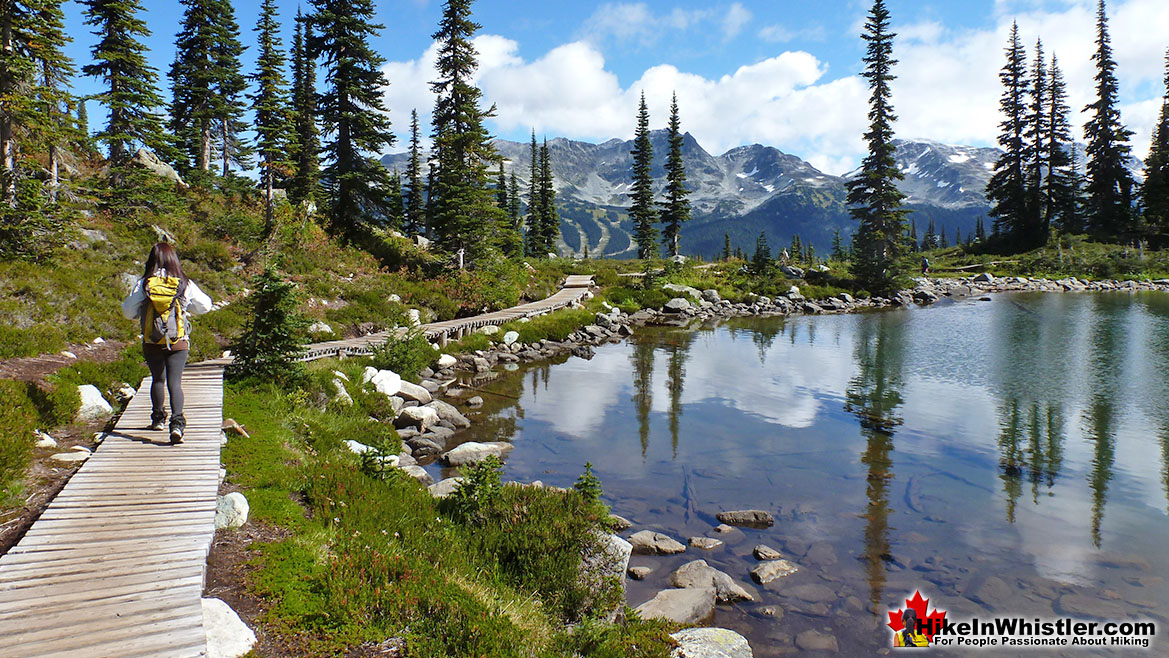
The Harmony Meadows trail is a section of the old Musical Bumps trail that has been renamed. So now you take the Harmony Meadows trail to the High Note trail, then come to the new, official Musical Bumps trailhead. But locals still tend to refer to the Musical Bumps trail as starting at the Roundhouse Lodge and finishing where it meets the Singing Pass trail. The Harmony Lake trail runs roughly parallel to the Harmony Meadows trail and also meets the High Note trail and continues to the new Musical Bumps trailhead. Taken together, the Harmony Meadows trail and the Harmony Lake trail form a nice, though often very steep, loop trail starting and finishing at the Roundhouse Lodge.
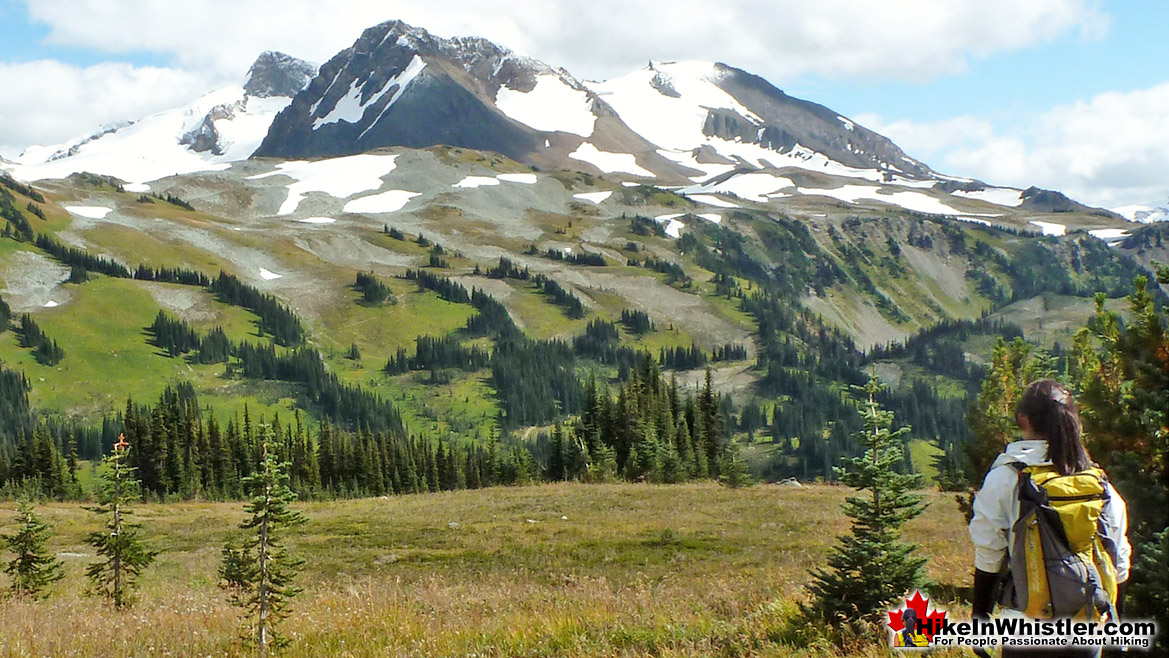
Trail names have been evolving over the recent years and keep in mind that you may not see any mention of Russet Lake, Singing Pass trail, or even the Musical Bumps trail until you get a couple kilometres into the trail. From the Roundhouse Lodge, look for the trail marked as Harmony Lake trail and continue onto the High Note trail. See the map below. At the bottom right corner, the Musical Bumps trail continues to Russet Lake, where the High Note trail bends to the right, towards Whistler Peak. The Musical Bumps trail next takes you to Flute Summit. At Flute Summit follow the signs to Singing Pass. The signs on this route are sometimes confusing as some get destroyed during the winter. Just be sure to aim for Flute Summit, then Singing Pass, then Russet Lake. From Russet Lake, you can return to Whistler Village the way you came, or via the High Note trail, or via the Singing Pass trail, which brings you back to Whistler Village.
Russet Lake via the High Note trail(14.5k)
![]() The Peak Chair, High Note trail route to Russet Lake is the most scenic, however two kilometres longer than the Musical Bumps Route. The 2k is well worth it though for the views from the High Note trail as well as the Peak Chair. Any time of year the Peak Chair is like a carnival ride, exhilarating, and wonderful, but in the summer, it’s surreal as well. Great walls of snow pass under you far below, as you glide upward at times at a shocking degree. The incline of the ride is extreme, so steep as the breathtaking scenery cannot even distract fully from the nervousness you will surely feel as you glance down, 20 metres to the boulder field below. Then you arrive, the peak of Whistler Mountain, what a magnificent way to start a hike. You are still four hours from Russet Lake, but the adventure is well underway.
The Peak Chair, High Note trail route to Russet Lake is the most scenic, however two kilometres longer than the Musical Bumps Route. The 2k is well worth it though for the views from the High Note trail as well as the Peak Chair. Any time of year the Peak Chair is like a carnival ride, exhilarating, and wonderful, but in the summer, it’s surreal as well. Great walls of snow pass under you far below, as you glide upward at times at a shocking degree. The incline of the ride is extreme, so steep as the breathtaking scenery cannot even distract fully from the nervousness you will surely feel as you glance down, 20 metres to the boulder field below. Then you arrive, the peak of Whistler Mountain, what a magnificent way to start a hike. You are still four hours from Russet Lake, but the adventure is well underway.
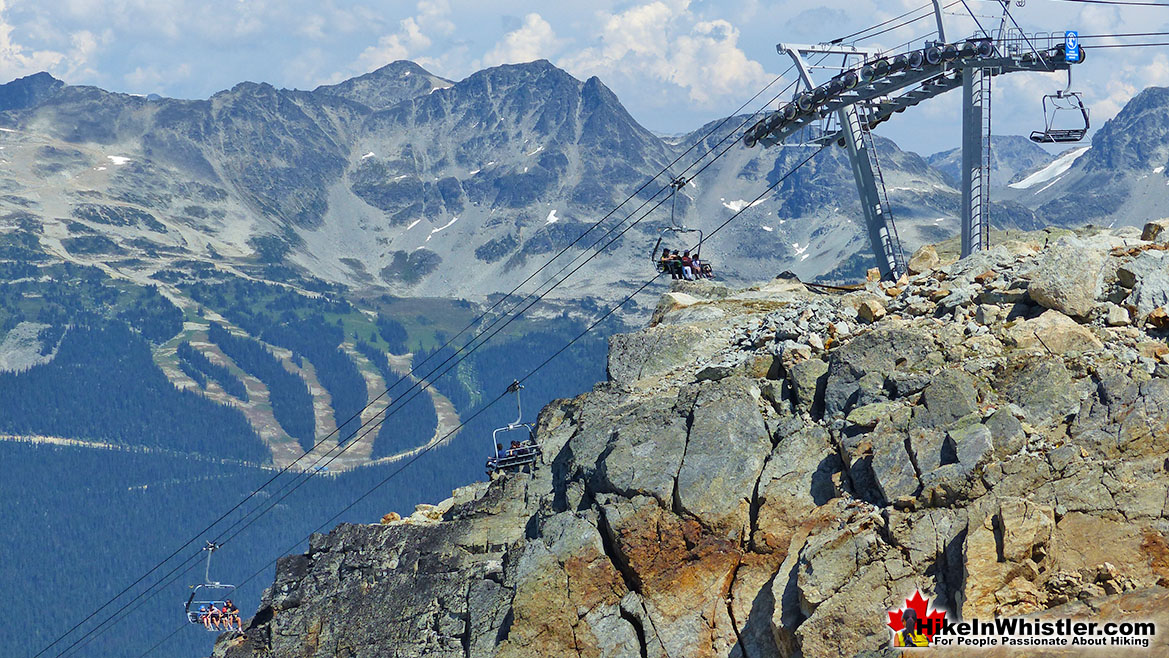
From the top of the Peak chair, follow the signs for the High Note trail and Singing Pass. The trail is 14.5 kilometres with several ascents and descents on the way. The High Note trail eventually joins with the Musical Bumps trail part way along and continues to the junction of the Singing Pass trail. Left goes to Whistler Village and right goes to Russet Lake(3 kilometres).
Village to Russet Lake via Singing Pass(14.5k)
![]() The Singing Pass trail has the great benefit of being free. The other two routes require purchasing a lift ticket for the Whistler Gondola. The Singing Pass trail is 14.5 kilometres to Russet Lake and constantly uphill, though by no means difficult. It is a relentless ascent, however, and fairly boring. The trail is fairly uneventful as is runs through deep forest for much of the first 10 kilometres. The trail has a couple of washouts. One, about 40 minutes into the trail is quite bad. Looks like a large avalanche across the trail, trees, loose dirt. It is passable though with a little scrambling, but be prepared for this inconvenience. This area has caused some confusion in recent years as for a time the Whistler Info Centre mistakenly called the Singing Pass trail closed because of this section. Also, in recent years there have been cases of bridge damage along the trail, however, parks staff quickly repair the bridges. Keep this in mind when hiking this trail, certainly in June, you will find extensive damage to the trail left over from the winter. Usually just fallen trees criss-crossing the trail, but don't be surprised if you come to a washed out bridge that has to be scrambled across with some difficulty. After this the trail is well maintained with small bridges over cute creeks. At 10.5k it finally opens up to the alpine. The views immediately become magnificent. The junction at 11.5k splits the trail. Left goes to Russet Lake (3k), and right goes to Whistler Mountain via the Musical Bumps trail. If you are confident in making the Whistler Gondola during open hours, returning to Whistler by this route is a beautiful option.
The Singing Pass trail has the great benefit of being free. The other two routes require purchasing a lift ticket for the Whistler Gondola. The Singing Pass trail is 14.5 kilometres to Russet Lake and constantly uphill, though by no means difficult. It is a relentless ascent, however, and fairly boring. The trail is fairly uneventful as is runs through deep forest for much of the first 10 kilometres. The trail has a couple of washouts. One, about 40 minutes into the trail is quite bad. Looks like a large avalanche across the trail, trees, loose dirt. It is passable though with a little scrambling, but be prepared for this inconvenience. This area has caused some confusion in recent years as for a time the Whistler Info Centre mistakenly called the Singing Pass trail closed because of this section. Also, in recent years there have been cases of bridge damage along the trail, however, parks staff quickly repair the bridges. Keep this in mind when hiking this trail, certainly in June, you will find extensive damage to the trail left over from the winter. Usually just fallen trees criss-crossing the trail, but don't be surprised if you come to a washed out bridge that has to be scrambled across with some difficulty. After this the trail is well maintained with small bridges over cute creeks. At 10.5k it finally opens up to the alpine. The views immediately become magnificent. The junction at 11.5k splits the trail. Left goes to Russet Lake (3k), and right goes to Whistler Mountain via the Musical Bumps trail. If you are confident in making the Whistler Gondola during open hours, returning to Whistler by this route is a beautiful option.
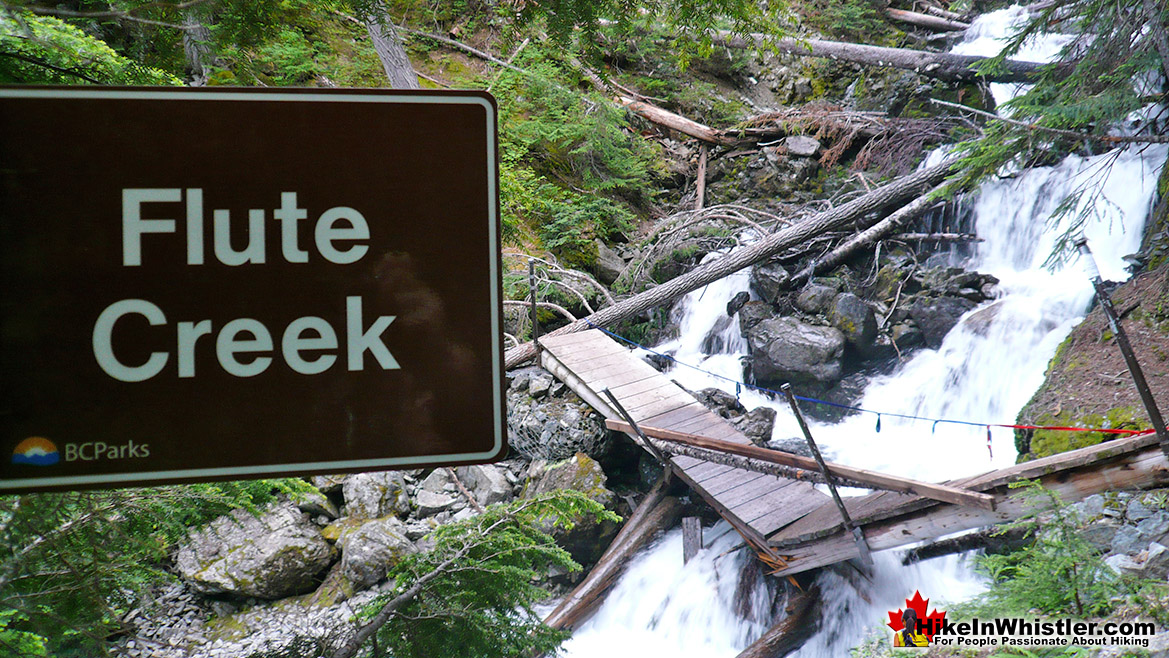
Russet Lake Trail Map
![]() The Singing Pass trail is free to hike, though you still have to pay for overnight camping if you are staying. The Musical Bumps trail will cost you a lift pass to get up to the start of the trail on Whistler Mountain. Musical Bumps can be reached in a couple ways. The nicest route is via the High Note trail at the top of Whistler Mountain. The slightly more direct route is by getting on the Musical Bumps trail near the Roundhouse Lodge.
The Singing Pass trail is free to hike, though you still have to pay for overnight camping if you are staying. The Musical Bumps trail will cost you a lift pass to get up to the start of the trail on Whistler Mountain. Musical Bumps can be reached in a couple ways. The nicest route is via the High Note trail at the top of Whistler Mountain. The slightly more direct route is by getting on the Musical Bumps trail near the Roundhouse Lodge.
Camping at Russet Lake in Garibaldi Park
![]()
![]() Russet Lake campground has just a few spots to put up a tent. You will find several gravel clearings and some with rock cairns to block the wind. Officially there are only 7 tent areas, however you can manage quite a few more if the rest are taken. The enormous Kees and Claire Memorial Hut is also available to use by anyone for $45 per bed. You have to reserve ahead of time on the Spearhead Huts site here. Russet Lake is in a stunning valley at the shore of Russet Lake and overlooking a glacier valley with Overlord Glacier far below. On a busy day you might see dozens of tents in the grass and gravel meadow that surrounds the lake. Like other Garibaldi Park campgrounds, Russet Lake is open year-round, but mostly used in the summer months. Russet Lake is part of the winter skiing/snowboarding route, the Spearhead Traverse. Popular in the winter for hardcore skiers and snowboarders, two more huts are planned for construction along the Spearhead Traverse that effectively connects Whistler Mountain to Blackcomb Mountain. Russet Lake Campground: 20 tent spots near the Kees and Claire Memorial Hut ($45 per bed). Overlooks Overlord Glacier. Fees: $12 Adult, $6 Kids (6-15) for tent camping.
Russet Lake campground has just a few spots to put up a tent. You will find several gravel clearings and some with rock cairns to block the wind. Officially there are only 7 tent areas, however you can manage quite a few more if the rest are taken. The enormous Kees and Claire Memorial Hut is also available to use by anyone for $45 per bed. You have to reserve ahead of time on the Spearhead Huts site here. Russet Lake is in a stunning valley at the shore of Russet Lake and overlooking a glacier valley with Overlord Glacier far below. On a busy day you might see dozens of tents in the grass and gravel meadow that surrounds the lake. Like other Garibaldi Park campgrounds, Russet Lake is open year-round, but mostly used in the summer months. Russet Lake is part of the winter skiing/snowboarding route, the Spearhead Traverse. Popular in the winter for hardcore skiers and snowboarders, two more huts are planned for construction along the Spearhead Traverse that effectively connects Whistler Mountain to Blackcomb Mountain. Russet Lake Campground: 20 tent spots near the Kees and Claire Memorial Hut ($45 per bed). Overlooks Overlord Glacier. Fees: $12 Adult, $6 Kids (6-15) for tent camping.
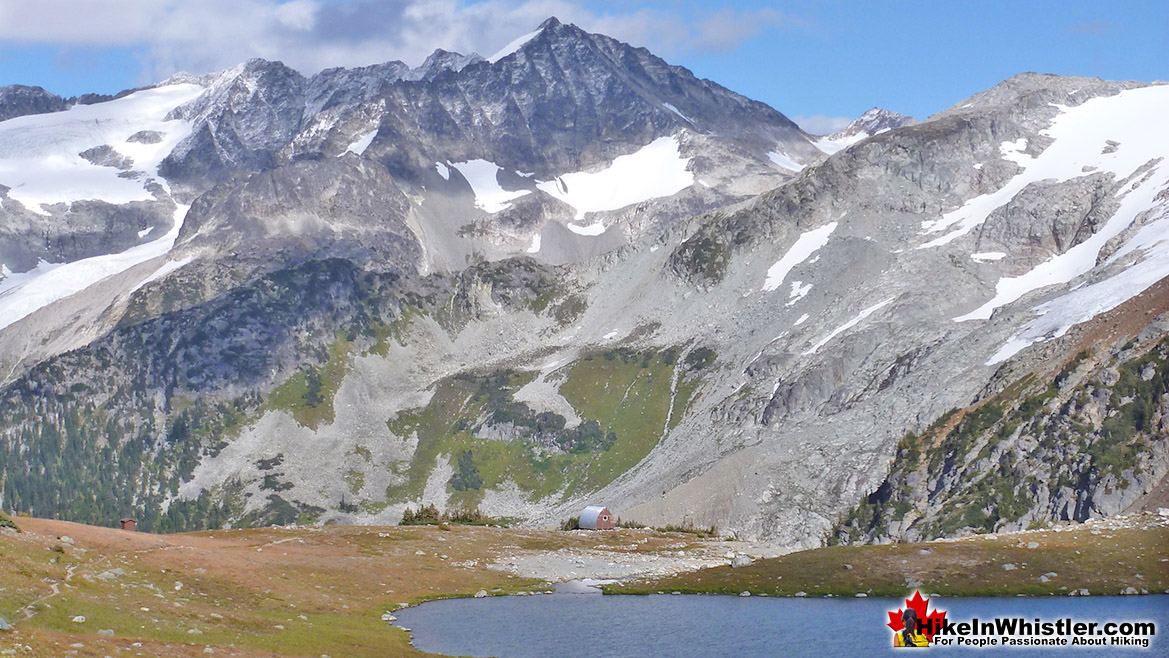
Camping in Garibaldi Provincial Park
Day hiking in Garibaldi Provincial Park is free, but parking at trailheads requires a free day-use pass, reservable online at https://camping.bcparks.ca/. Overnight camping requires a campsite reservation, also made online. There are ten official BC Parks campgrounds with well-designed tent pads, all reservable year-round except Red Heather (winter-only). Wilderness camping is permitted in designated areas for $10 per person per night, with restrictions to manage park impact. Fees are $12 per adult (16+) and $6 per child (6-15) per night in 2025, with children under 6 free. Reservations are site-specific but not for individual tent pads (first-come, first-served upon arrival).
- Garibaldi Lake Campground: 50 tent pads in a beautiful forest near the lake’s turquoise shores. Features outhouses, picnic tables, and a bear-proof food storage hut. A BC Parks ranger cabin is often staffed in summer. Fees: $12 Adult, $6 Kids (6-15).
- Taylor Meadows Campground: 40 tent pads in a lush forest with views of Black Tusk. Includes a food storage hut and nearby ranger cabin. Fees: $12 Adult, $6 Kids (6-15).
- Helm Creek Campground: 30 tent pads in a scenic meadow with Black Tusk views. Features bear-proof food cables and outhouses. Fees: $12 Adult, $6 Kids (6-15).
- Cheakamus Lake Campground: 8 tent clearings in a forest along the lake’s sunny shore. Includes a bear-proof food hang and outhouses. Fees: $12 Adult, $6 Kids (6-15).
- Singing Creek Campground: 6 tent clearings near Singing Creek, with a bear-proof food hang and outhouse. Fees: $12 Adult, $6 Kids (6-15).
- Russet Lake Campground: 20 tent spots near the Kees and Claire Memorial Hut ($45 per bed). Overlooks Overlord Glacier. Fees: $12 Adult, $6 Kids (6-15) for tent camping.
- Wedgemount Lake Campground: 20 tent pads, some on wooden platforms, with stunning lake and glacier views. Fees: $12 Adult, $6 Kids (6-15).
- Elfin Lakes Campground: 35 tent pads and a large hut with 33 bunks. Fees: $12 Adult, $6 Kids (6-15) for tent camping; hut fees are $25 per person per night.
- Rampart Ponds Campground: 12 tent clearings, 1.5 kilometres from Mamquam Lake. Fees: $12 Adult, $6 Kids (6-15).
All campgrounds are well-maintained but busy in summer. Pack out all garbage, as no facilities are provided. Most campsites have fresh water, but filtering or treating water at Garibaldi Lake and Elfin Lakes is recommended.
Facilities at Russet Lake
![]() There are few facilities at Russet Lake aside from the Kees and Claire Hut. Like the rest of Garibaldi Provincial Park there are no garbage facilities, so you have to pack out what you pack in. One outhouse, and 20 tent clearings. Some with cairns to block the wind. They are in a beautiful setting and the whole campground overlooks the mighty Overlord Glacier and is flanked by The Fissile. Fresh water can be found from the fast flowing creek that spills out of Russet Lake. You can drink directly from the creek as it is clean glacier water, however you will see BC Parks warnings to treat or boil water.
There are few facilities at Russet Lake aside from the Kees and Claire Hut. Like the rest of Garibaldi Provincial Park there are no garbage facilities, so you have to pack out what you pack in. One outhouse, and 20 tent clearings. Some with cairns to block the wind. They are in a beautiful setting and the whole campground overlooks the mighty Overlord Glacier and is flanked by The Fissile. Fresh water can be found from the fast flowing creek that spills out of Russet Lake. You can drink directly from the creek as it is clean glacier water, however you will see BC Parks warnings to treat or boil water.
Restrictions and Concerns at Russet Lake
![]()
![]()
![]()
![]() As with much of Garibaldi Provincial Park, dogs are not welcome. Fires are also prohibited due to the extreme forest fire risk as well as no available firewood. The trees in the alpine take forever to grow and chopping one down for a fire would be pretty insulting to such a beautiful place. Bikes are also prohibited on Whistler Mountain, except of course in the bike park. The wonderful and long 11.5 kilometre Singing Pass trail would be wonderful to ride out, however this is not allowed either. You almost always see bike tracks on the Singing Pass trail, despite the prohibition. If you are caught by BCParks staff they will confiscate your front tire and you will have to retrieve it the next day. There are also no motorized vehicles allowed around Russet Lake or in any of Garibaldi Provincial Park.
As with much of Garibaldi Provincial Park, dogs are not welcome. Fires are also prohibited due to the extreme forest fire risk as well as no available firewood. The trees in the alpine take forever to grow and chopping one down for a fire would be pretty insulting to such a beautiful place. Bikes are also prohibited on Whistler Mountain, except of course in the bike park. The wonderful and long 11.5 kilometre Singing Pass trail would be wonderful to ride out, however this is not allowed either. You almost always see bike tracks on the Singing Pass trail, despite the prohibition. If you are caught by BCParks staff they will confiscate your front tire and you will have to retrieve it the next day. There are also no motorized vehicles allowed around Russet Lake or in any of Garibaldi Provincial Park.
Wildlife at Russet Lake
![]() Russet Lake is home to hoary marmots that love to live in the boulder fields that surround the lake. You will hear them before you see them as they whistle quite loudly when they know people or predators are around. Hoary marmots are the cute, invariably pudgy, twenty plus pound ground squirrels that have evolved to live quite happily in the hostile alpine areas of much of the world. In the northwest of North America, marmots have a distinct grey in their hair, a hoary colour, so have been named hoary marmots. They manage to survive quite happily in the alpine, largely by hibernating for 8 months of the year and largely for having a surprisingly varied array of food in such an inhospitable environment. They live off of grasses, berries, lichens, mosses, and roots and flowers. And live quite well it seems, as they always look chubby, which has one great drawback. They are sought after by bears and wolves. They have a wonderful defence system though. They are constantly on watch and whistle loudly at the first sign of danger, alerting the colony. The prevalence of these "whistlers" as they came to be locally called, in the early days of London Mountain resulted in it's name being changed to Whistler Mountain in the 60's. Hiking on Whistler Mountain, Blackcomb Mountain or to Wedgemount Lake in the summer, will almost guarantee an encounter with a chubby, jolly little Whistler hoary marmot.
Russet Lake is home to hoary marmots that love to live in the boulder fields that surround the lake. You will hear them before you see them as they whistle quite loudly when they know people or predators are around. Hoary marmots are the cute, invariably pudgy, twenty plus pound ground squirrels that have evolved to live quite happily in the hostile alpine areas of much of the world. In the northwest of North America, marmots have a distinct grey in their hair, a hoary colour, so have been named hoary marmots. They manage to survive quite happily in the alpine, largely by hibernating for 8 months of the year and largely for having a surprisingly varied array of food in such an inhospitable environment. They live off of grasses, berries, lichens, mosses, and roots and flowers. And live quite well it seems, as they always look chubby, which has one great drawback. They are sought after by bears and wolves. They have a wonderful defence system though. They are constantly on watch and whistle loudly at the first sign of danger, alerting the colony. The prevalence of these "whistlers" as they came to be locally called, in the early days of London Mountain resulted in it's name being changed to Whistler Mountain in the 60's. Hiking on Whistler Mountain, Blackcomb Mountain or to Wedgemount Lake in the summer, will almost guarantee an encounter with a chubby, jolly little Whistler hoary marmot.
Whistler is home to plenty of black bears, though sightings near Russet Lake are infrequent. At lower elevations seeing a bear is far more likely. Riding up the gondolas to Whistler Mountain or Blackcomb Mountain will almost guarantee you a bear sighting in the summer months. It is not unusual to see multiple bears on the 22 minute gondola ride up Whistler Mountain.
Trailhead & Parking Directions to the Singing Pass Trail
![]()
![]()
![]() Overnight parking for Russet Lake/Singing Pass is located in Whistler Village in Lot 4. Parking is very well organized and central in Whistler Village, so as you drive into Whistler Village by either Village Gate Boulevard or Lorimer Road, just look for the parking lot signs. From the highway, turn onto either Lorimer Rd or Village Gate, then in two blocks you will come to Blackcomb Way. From Village Gate turn left to see the entrance to the four huge, connected parking lots(Lot 1, Lot 2, Lot 3 and Lot 4). From Lorimer Rd, you can continue past Blackcomb Way and find a more direct, side entrance to Lot 4 (right off of Lorimer Rd). Make sure to pay close attention to where you can legally park overnight for the Singing Pass trail. There is a dedicated parking section for Garibaldi Park hikers. The Singing Pass, Garibaldi Provincial Park trailhead is just down from Lot 4 at the base of Whistler Mountain(under the Blackcomb Gondola). the trailhead(about 1.5k from Lot 4).
Overnight parking for Russet Lake/Singing Pass is located in Whistler Village in Lot 4. Parking is very well organized and central in Whistler Village, so as you drive into Whistler Village by either Village Gate Boulevard or Lorimer Road, just look for the parking lot signs. From the highway, turn onto either Lorimer Rd or Village Gate, then in two blocks you will come to Blackcomb Way. From Village Gate turn left to see the entrance to the four huge, connected parking lots(Lot 1, Lot 2, Lot 3 and Lot 4). From Lorimer Rd, you can continue past Blackcomb Way and find a more direct, side entrance to Lot 4 (right off of Lorimer Rd). Make sure to pay close attention to where you can legally park overnight for the Singing Pass trail. There is a dedicated parking section for Garibaldi Park hikers. The Singing Pass, Garibaldi Provincial Park trailhead is just down from Lot 4 at the base of Whistler Mountain(under the Blackcomb Gondola). the trailhead(about 1.5k from Lot 4).
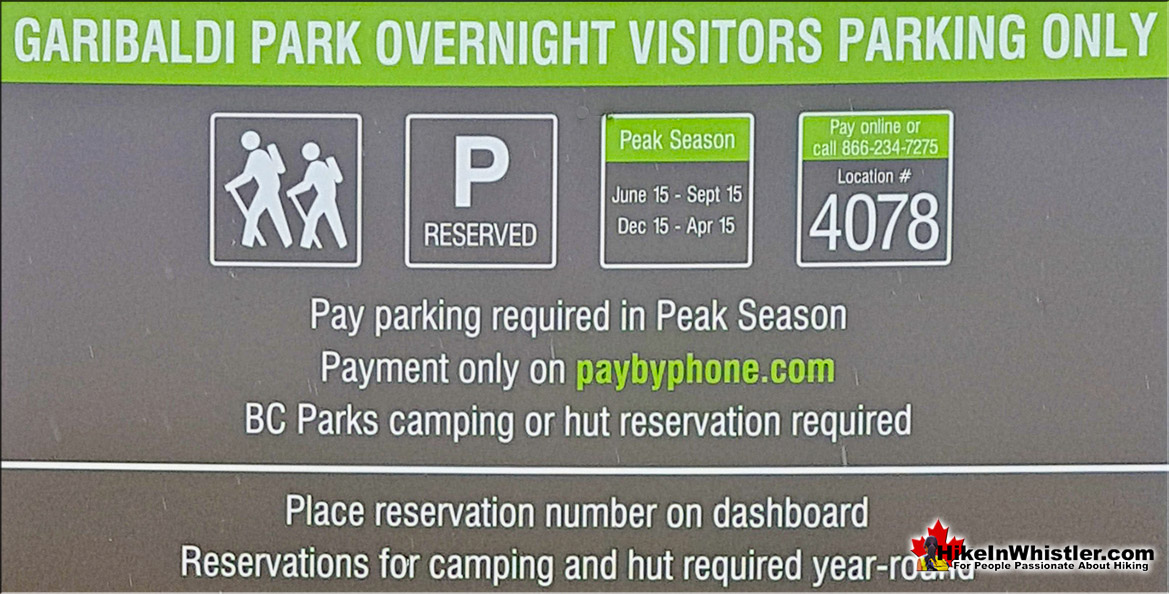
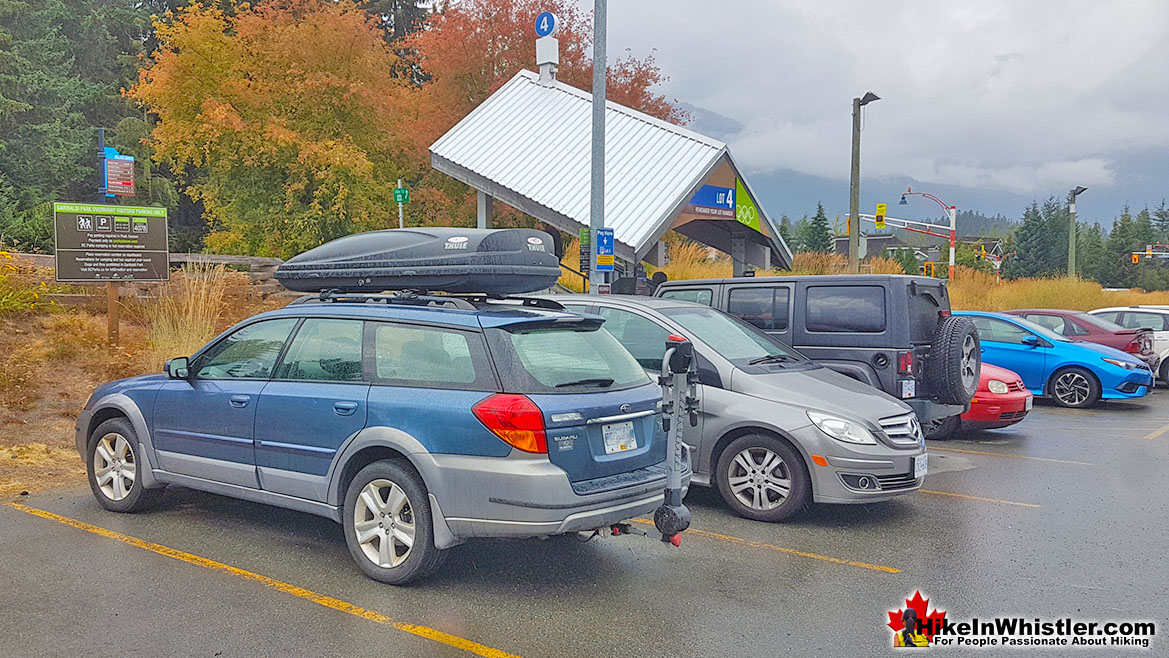
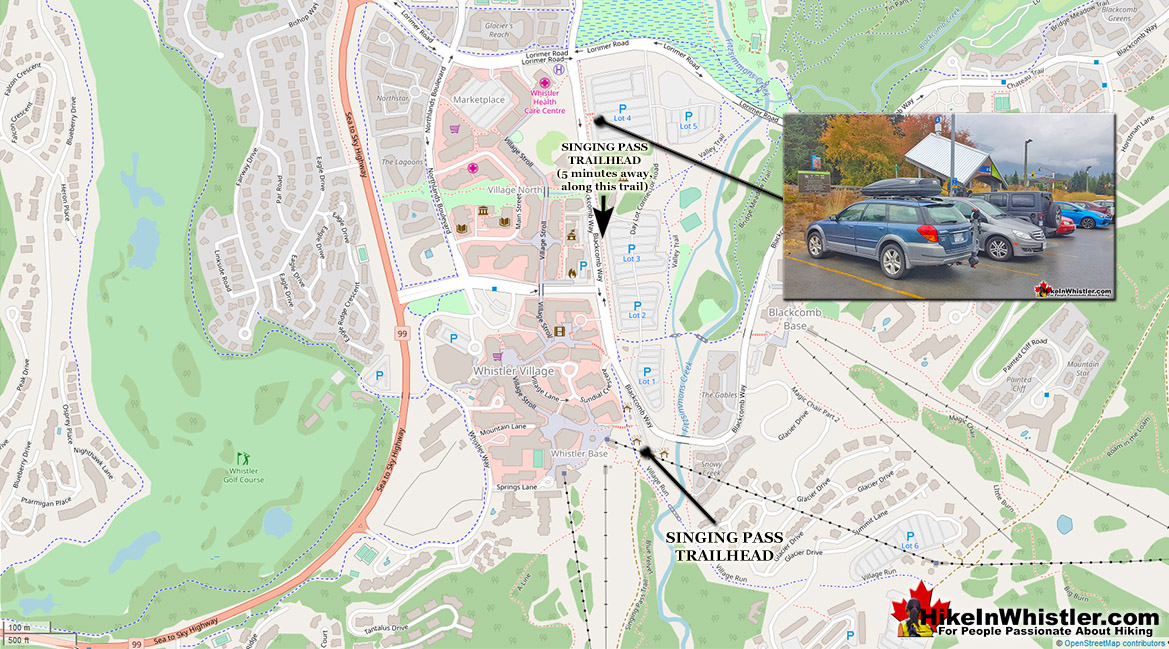
Whistler's Best Hiking Trails!
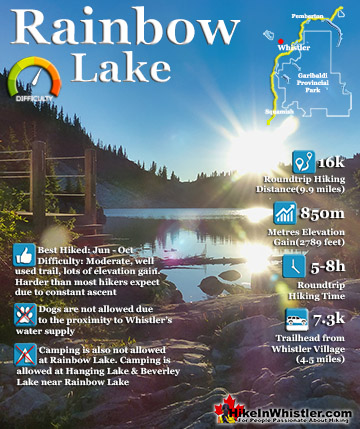
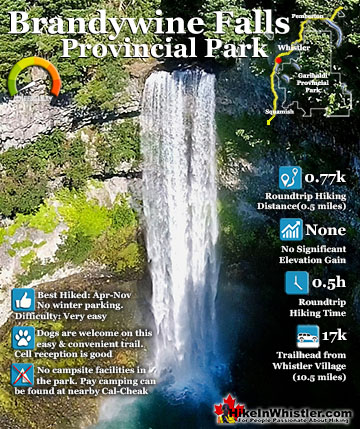
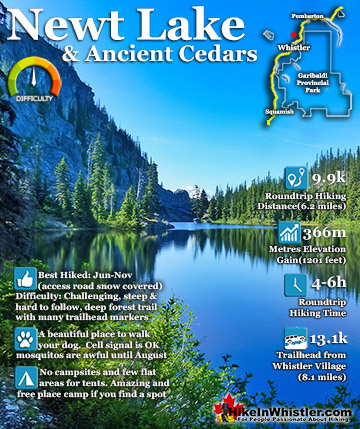
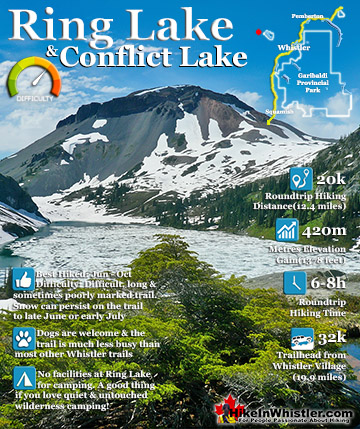
Whistler & Garibaldi Park Best Hiking by Month!
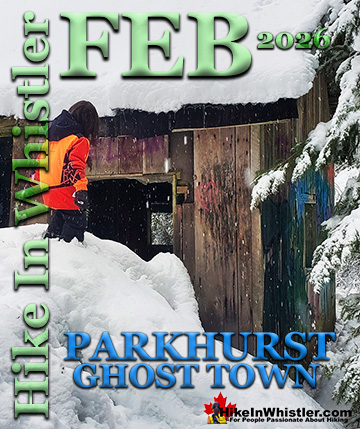
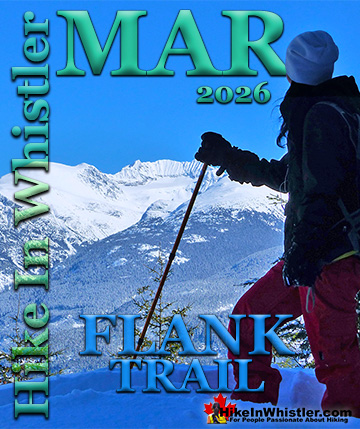
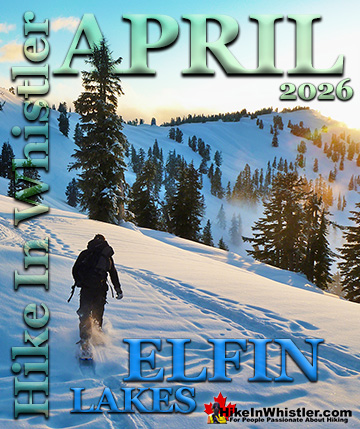

Explore BC Hiking Destinations!
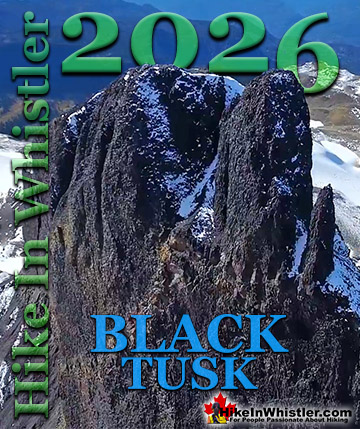
Whistler Hiking Trails
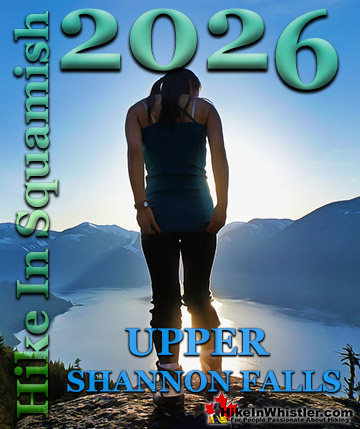
Squamish Hiking Trails
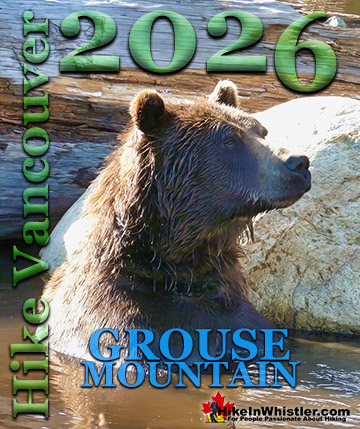
Vancouver Hiking Trails
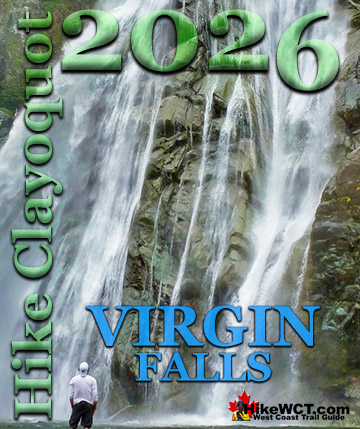
Clayoquot Hiking Trails
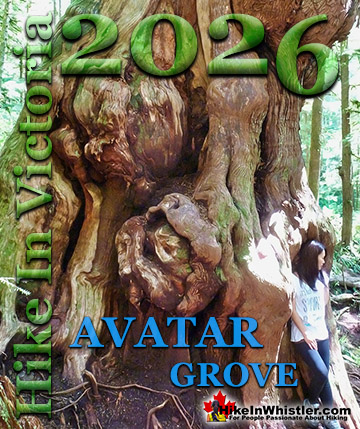
Victoria Hiking Trails
